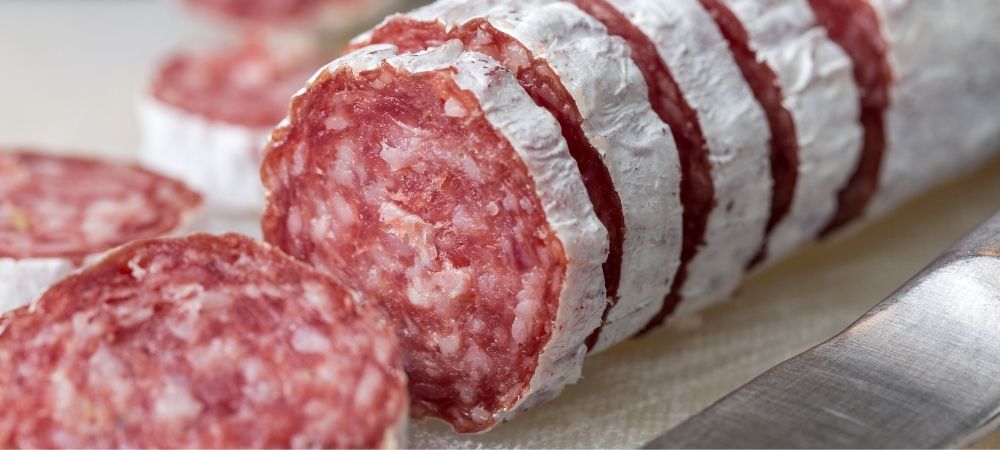
My pup’s curiosity is always at its highest when I sit down for breakfast. There are usually some eggs, milk, and bread around, but he always fixates on processed meats. Salami, in particular.
Can dogs eat salami and enjoy it? I talked to a vet, and here’s what I found out.
Can Dogs Eat Salami?
No, dogs should not eat salami. Salami is one of the most processed meats, and it contains high amounts of sodium and fat, which are harmful to dogs. If you let your dog eat salami regularly, you are putting them at risk from obesity, diabetes, and salt poisoning.
Additionally, salami often contains toxic seasonings. Onion and garlic are among the worst since they are highly toxic to dogs. Even a small amount of these can be fatal.
That being said, if your dog ate a slice or two of salami, they will probably be alright. But you should be careful not to feed them too much and check the ingredients.
Is Salami Bad for Dogs?
Processed food is bad, both for dogs and humans. However, some salami ingredients simply do not belong in a dog’s diet and can pose significant health risks. Let’s look at the common salami ingredients and what they mean for your furry friend.
Salt
Salami usually contains a lot of salt. A 3.53 oz piece of salami contains 1740 mg of sodium.
To put this into perspective, a 33-pounds dog needs less than 100 mg of sodium daily. Since one slice of salami has about 214 mg of salt, this is twice the daily recommended amount!
Salt is dangerous because it can cause extreme dehydration and salt toxicity. These can result in organ failure, coma, and even the pet’s death.
Garlic
Garlic is often used in human foods. The reason is twofold: for flavoring and because it kills bacteria.
As far as dogs are concerned, garlic is extremely toxic to them. Some breeds are more sensitive to garlic. For example, Akita and Shiba Inu are known to suffer from even small amounts of garlic.
Garlic leads to garlic toxicity and hemolytic anemia, which can end in the death of a pet. Make sure that the salami you’re offering to the dog contains no garlic.
Spices
Salami is usually made with various spices. Some of these are beneficial for dogs. For example, parsley in small amounts is safe and offers health benefits.
Other spices can be problematic, though.
Rosemary is a highly debated spice. ASPCA lists it as non-toxic to dogs. There may be even some health benefits — primarily its antioxidant properties.
However, rosemary contains oils that cause digestive issues, skin problems, and even CNS depression in dogs.
Turmeric is another salami spice to watch out for. While it could be ok in small quantities, turmeric has anticoagulant properties. Combined with garlic in salami, it could wreak havoc in a dog’s body and further exacerbate problems with blood clotting.
Wine
Wine is traditionally used as a salami ingredient. Humans may love it, but even small amounts of wine can be deadly to dogs.
First off, any alcohol can induce alcohol poisoning in dogs. Alcohol poisoning leads to dehydration, organ failure, and the death of the pet.
Not only that, but remember that wine is made from grapes which are highly toxic to dogs.
Vinegar
Another common ingredient in salami is vinegar. Vinegar is used for preservation.
Dogs eating salami with vinegar can experience a host of digestive issues. It is especially dangerous for dogs with kidney problems because it triggers dehydration.
Calories
There are considerable calories in salami. A 3.53 oz piece of salami contains 336 calories and 0.03 oz of sugar.
Salami is also very high in fat. A typical salami contains 26% fat which can lead to many health problems. The dog can gain weight, become obese and develop related health issues.
One of these is pancreatitis, a severe and painful inflammation of the pancreas. Pancreatitis can even result in the death of a pet.
Too much salami also leads to dehydration and damages the dog’s heart, liver, kidneys, and urinary tract. Be careful to feed your dog salami only in small amounts and rarely.

Different Types of Salami
Salami is unhealthy for dogs if fed regularly and in high amounts. Some types of salami are more dangerous than others and pose different health risks.
Let’s look at the common types and what you should know about them.
Can Dogs Eat Cooked Salami?
Generally speaking, a cooked salami is still better than an uncooked one. Cooking meat destroys salmonella and trichinella spiralis, the pathogens which can cause severe medical problems.
However, you need to ensure that the salami does not contain any toxic ingredients, especially garlic. Eating salami with garlic can result in garlic toxicity and even the pet’s death.
Otherwise, eating a small piece of this salami shouldn’t harm your dog. But bear in mind that it is still very high in fat and salt. You shouldn’t offer it regularly to your dog, and not in high amounts.
Can Dogs Eat Dry Salami?
Dry salami is made with beef and contains less fat.
Dogs can eat a very small amount of dry salami. But it is still pretty high in salt, so limit the amount you offer.
Also, make sure there are no harmful ingredients, especially garlic.
Can Dogs Eat Hard Salami?
Hard salami is another name for dry salami, so dogs can eat a small amount of it.
The problem with both hard and dry salami is their salt content. Since they are dried, the salt is more concentrated. Smaller amounts of this salami carry a higher risk for salt poisoning.
Also, make sure there are no harmful spices if you are offering hard salami to your dog.
Can Dogs Eat Salami Slices?
If you are offering your dog salami, slices are probably the best option.
Portion control is easiest with salami slices, and you can monitor how much the dog eats. A slice or two now and then is unlikely to hurt your dog.
Make sure to monitor your dog for any signs of digestive distress, vomiting, upset stomach. Lethargy is often a telltale sign that you should call a veterinarian.
Can Dogs Eat Salami Sticks?
For the most part, dogs shouldn’t eat salami sticks.
The problem is that a dog will not stop himself from chewing on the stick and swallowing large chunks of it at once. This can lead to choking or intestinal blockage in some cases. It’s safer if you offer dog slices instead. Or cut it into super small pieces.
Also, keep an eye on the pet when they eat salami. Any sign of vomiting, lethargy, or other signs should signal a visit to the vet.
High amounts of salami contain loads of salt, which is very dangerous. Dogs eating salami regularly can suffer from sodium poisoning and even damage their heart, kidneys, and liver.
Can Dogs Eat Turkey Salami?
Dogs can eat turkey salami.
This type of salami is lower in fat than many other types of lunchmeat available to humans. Still, limit the amount allowed per meal because even though it has less fat than most types of meat products, the sodium levels are still high for a dog. Too much salt leads to sodium poisoning and other health problems.
Can Dogs Eat Spicy Salami?
Generally, dogs should not eat spicy foods. Spices could cause gastrointestinal upset and burning sensations in dogs.
If the salami contains a toxic ingredient (such as garlic or onion), it could be fatal.
It’s probably best to avoid spicy salami.
Can Dogs Eat Genoa Salami?
Genoa salami is a type of meat made from pork, fat, and wine. As long as the sausage contains no harmful ingredients — including garlic — dogs can eat a small amount.
But be careful about portion control since even a small piece can hurt your dog’s digestive system. It may cause gastrointestinal upset and, in some cases, alcohol poisoning.
The Genoa salami is high in fat, so it shouldn’t be a regular food item. Fatty foods lead to weight gain, obesity and could cause pancreatitis down the line.
The bigger concern is salt, though. Too much salt in a salami leads to salt toxicity and can cause liver failure. Call a vet if you notice your dog having an upset stomach, vomiting, and being unusually thirsty.
Can Dogs Eat Cotto Salami?
Cotto salami is a type of meat brought to a high temperature, and dogs can eat it in very small portions.
The biggest concern with this kind of salami is the sodium content. It’s high for dogs, so limit how much you offer at once to prevent salt poisoning.
Also, watch out for any added and toxic ingredients, like garlic and onion.
Can Dogs Eat Uncured Salami?
It’s not a good idea to feed your dog uncured salami. While it has less salt than any cured sausage, it still poses other health risks.
Uncured salami has high-fat content, leading to weight gain, obesity, heart disease, and pancreatitis.
Additionally, cured meat has a much lower risk of salmonella. Uncured salami could contain harmful bacteria that sometimes require a long treatment.
Even if you opt for uncured salami, make sure it’s coming from a trustworthy vendor.

How Much Salami Can a Dog Eat?
Can dogs eat salami at all? There is no specific answer — it depends on the dog’s size, weight, and general health.
Take a look at your pet and consider whether they need the extra calories in their diet.
If your dog has gained a few pounds recently, you may want to exercise caution when offering salami. If they have excess weight, it’s not a good idea to give them this meat product.
Then, there is the salt content. Salt can be toxic for dogs, so salami is not the best option if they already consume a lot of salty foods.
A 33 lbs dog needs less than 100 mg of salt daily. Just one slice of salami contains twice that amount. Smaller dog breeds are at an even higher risk of sodium toxicity.
While one or two slices are unlikely to harm your dog (if there are no toxic ingredients), it’s best to avoid feeding dogs salami. Also, make sure your dog has access to fresh water at all times.
What to Do if Your Dog Ate Salami?
One or two slices of salami shouldn’t hurt your dog if there are no toxic ingredients.
If dogs eat salami regularly, they are at risk of salt poisoning. Symptoms of salt poisoning include:
- Diarrhea
- Vomiting
- Excessive thirst and urination
- High body temperature
- Trembling
- Seizures
Always provide access to fresh water, and if you notice the above symptoms, call the veterinarian.
If the salami your dog ate has toxic ingredients, e.g. onion or garlic, take them to a vet clinic immediately. Even small amounts of these ingredients can be fatal for your canine companion.
If possible, it’s always a good idea to bring the packaging so the vet knows exact ingredients your dog ate.
How to Prevent My Dog from Eating Salami?
Ideally, your dog shouldn’t eat salami and other processed meats.
If your dog eats any, make sure they don’t have access to the whole package. You never know how much they will eat. Also, choose a well-known brand.
Keep the packaging away — if the dog ingests it, it can cause intestinal obstruction.
Always store leftovers in the refrigerator and throw them away after one or two days, as bacteria may develop on them.
Make sure your dog gets regular exercise and maintains a balanced diet. If you think salami is necessary for your small dog, consider checking with the vet first to see if it’s safe for their health.
If they have a healthy weight, you can offer them one or two slices of salami now and then.
The best prevention is proper training. Train your dog not to steal food and never leave them unattended around food.
Alternatives to Salami
Salami can be delicious and tempting, but it’s better left as human food.
There are, however, great alternatives you can offer your dog:
- Apples
- Blueberries
- Carrots
- White rice
- Fish
- Chicken
- Peanut butter
Dogs will enjoy these, and you won’t put them at risk of developing health issues. If you’d like to learn about more foods your dog can safely eat, check out this list.
Cured of Salami
Can dogs eat salami? Any processed meat carries health risks for your pooch. Salami is probably among the worse options.
Besides high-fat, high-salt content, salami can contain many toxic ingredients. Spices, onions and garlic, wine, and vinegar are all extremely harmful to dogs and can cause many serious health problems.
It’s best to steer clear of any salami. A healthy dog is a happy one, so give them all the love and right nutrition you can offer.
FAQ
Will dogs get fat from eating salami?
Yes, if you feed dogs salami regularly, they will get fat. Salami is very high in fat and salt. These lead to weight gain, obesity, hypertension, and salt poisoning.
Can dogs eat processed meat?
Processed meats are bad for dogs to eat regularly. Pepperoni is even higher in calories than salami and poses higher risks. Any processed meat can contain toxic substances, like garlic and onion. Onion and garlic toxicity is a serious condition and can lead to the pet’s death.
Can small dogs eat salami?
Small dog breeds have even lower calorie requirements. Feeding them even one slice greatly oversteps their daily requirements and could result faster in obesity and salt toxicity. It’s best not to feed smaller dogs salami.

